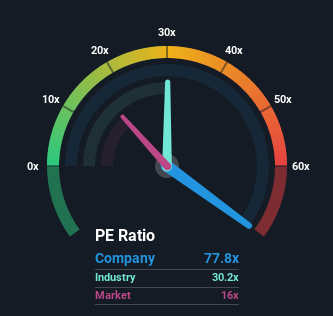- United States
- /
- IT
- /
- NasdaqCM:DTST
Data Storage Corporation's (NASDAQ:DTST) 29% Dip Still Leaving Some Shareholders Feeling Restless Over Its P/E Ratio
The Data Storage Corporation (NASDAQ:DTST) share price has fared very poorly over the last month, falling by a substantial 29%. The recent drop completes a disastrous twelve months for shareholders, who are sitting on a 72% loss during that time.
Even after such a large drop in price, Data Storage may still be sending very bearish signals at the moment with a price-to-earnings (or "P/E") ratio of 77.8x, since almost half of all companies in the United States have P/E ratios under 16x and even P/E's lower than 8x are not unusual. Nonetheless, we'd need to dig a little deeper to determine if there is a rational basis for the highly elevated P/E.
With earnings growth that's superior to most other companies of late, Data Storage has been doing relatively well. It seems that many are expecting the strong earnings performance to persist, which has raised the P/E. You'd really hope so, otherwise you're paying a pretty hefty price for no particular reason.
See our latest analysis for Data Storage

What Are Growth Metrics Telling Us About The High P/E?
Data Storage's P/E ratio would be typical for a company that's expected to deliver very strong growth, and importantly, perform much better than the market.
If we review the last year of earnings growth, the company posted a terrific increase of 134%. Still, incredibly EPS has fallen 33% in total from three years ago, which is quite disappointing. So unfortunately, we have to acknowledge that the company has not done a great job of growing earnings over that time.
Turning to the outlook, the next year should bring diminished returns, with earnings decreasing 199% as estimated by the one analyst watching the company. That's not great when the rest of the market is expected to grow by 9.8%.
In light of this, it's alarming that Data Storage's P/E sits above the majority of other companies. Apparently many investors in the company reject the analyst cohort's pessimism and aren't willing to let go of their stock at any price. There's a very good chance these shareholders are setting themselves up for future disappointment if the P/E falls to levels more in line with the negative growth outlook.
The Final Word
Even after such a strong price drop, Data Storage's P/E still exceeds the rest of the market significantly. We'd say the price-to-earnings ratio's power isn't primarily as a valuation instrument but rather to gauge current investor sentiment and future expectations.
Our examination of Data Storage's analyst forecasts revealed that its outlook for shrinking earnings isn't impacting its high P/E anywhere near as much as we would have predicted. When we see a poor outlook with earnings heading backwards, we suspect the share price is at risk of declining, sending the high P/E lower. This places shareholders' investments at significant risk and potential investors in danger of paying an excessive premium.
Plus, you should also learn about these 5 warning signs we've spotted with Data Storage (including 2 which can't be ignored).
If P/E ratios interest you, you may wish to see this free collection of other companies that have grown earnings strongly and trade on P/E's below 20x.
New: Manage All Your Stock Portfolios in One Place
We've created the ultimate portfolio companion for stock investors, and it's free.
• Connect an unlimited number of Portfolios and see your total in one currency
• Be alerted to new Warning Signs or Risks via email or mobile
• Track the Fair Value of your stocks
Have feedback on this article? Concerned about the content? Get in touch with us directly. Alternatively, email editorial-team (at) simplywallst.com.
This article by Simply Wall St is general in nature. We provide commentary based on historical data and analyst forecasts only using an unbiased methodology and our articles are not intended to be financial advice. It does not constitute a recommendation to buy or sell any stock, and does not take account of your objectives, or your financial situation. We aim to bring you long-term focused analysis driven by fundamental data. Note that our analysis may not factor in the latest price-sensitive company announcements or qualitative material. Simply Wall St has no position in any stocks mentioned.
About NasdaqCM:DTST
Data Storage
Provides enterprise cloud and business continuity solutions in the United States and internationally.
Flawless balance sheet with acceptable track record.
Similar Companies
Market Insights
Weekly Picks


Crazy Undervalued 42 Baggers Silver Play (Active & Running Mine)


Fiducian: Compliance Clouds or Value Opportunity?

Willamette Valley Vineyards (WVVI): Not-So-Great Value
Recently Updated Narratives


The Great Strategy Swap – Selling "Old Auto" to Buy "Future Light"


Not a Bubble, But the "Industrial Revolution 4.0" Engine


The "David vs. Goliath" AI Trade – Why Second Place is Worth Billions
Popular Narratives


MicroVision will explode future revenue by 380.37% with a vision towards success


NVDA: Expanding AI Demand Will Drive Major Data Center Investments Through 2026



